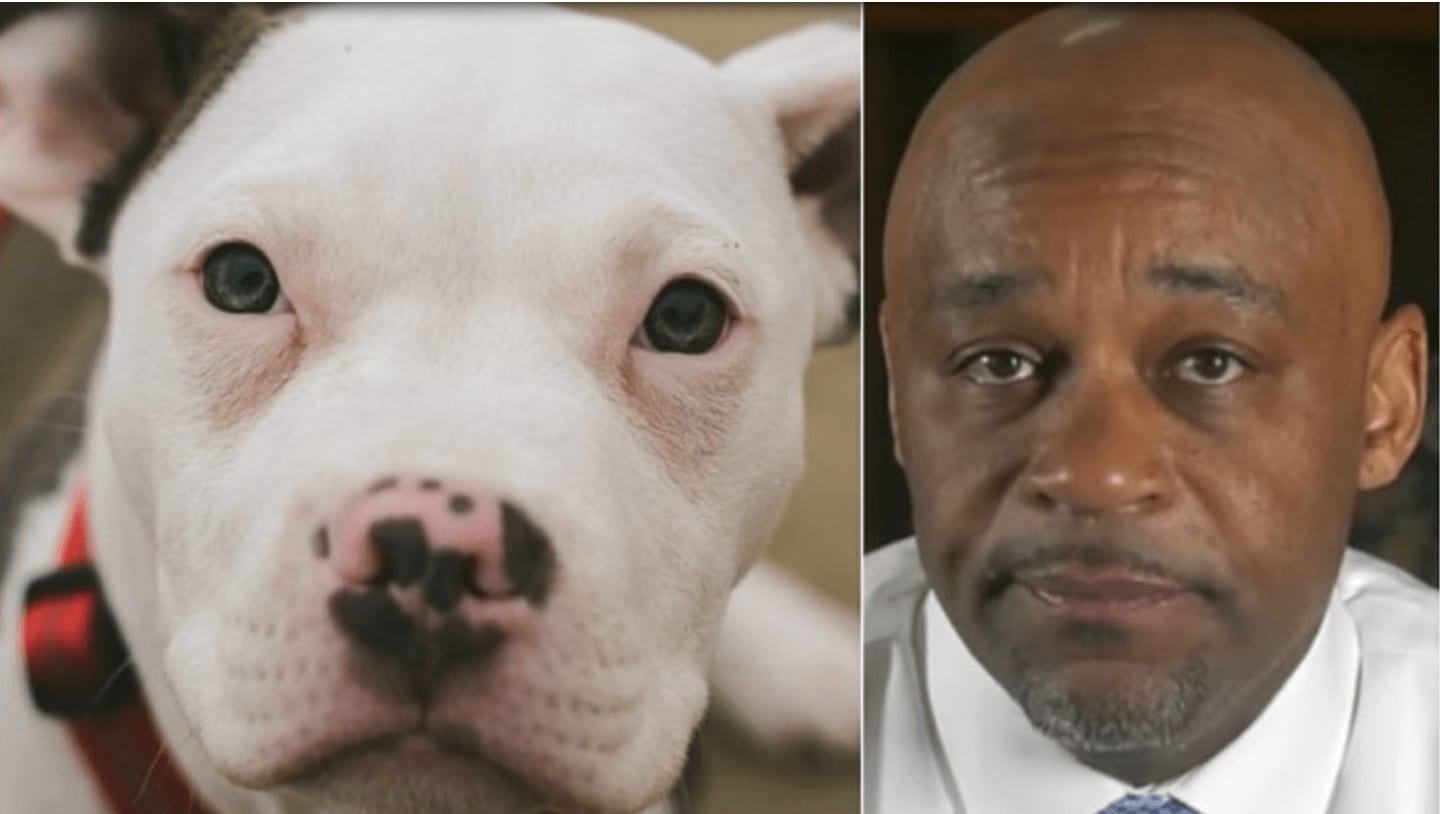
Denver City Council’s February 10 passage of a proposal creating a system to provisionally license three pit bull-related dog breeds that have been illegal in the jurisdiction since 1989 was celebrated by advocates, who insist that the current regulations are draconian (thousands of pits have been euthanized over the years) and ineffective.
However, Mayor Michael Hancock has not yet signed the measure into law and is unlikely to announce whether he will do so or not until tomorrow, February 14. In the meantime, he’s facing increasing pressure to veto the proposal. The council can override such an action, but nine votes are needed, and councilmember Chris Herndon’s proposal passed by only a 7- 4 margin — and while two of his colleagues missed the February 10 vote, one of them, Stacie Gilmore, had turned thumbs down on the notion during a preliminary session a week earlier.
There was so much excitement in Denver over the pit bull ban being lifted. But, it’s not official until Mayor Michael Hancock signs it. I have a feeling they nay sayers are more verbal than those in support. So, if you have something to say today is the day to speak up as he will announce tomorrow if he plans to sign the measure into law or not. Here’s how to contact Mayor Michael Hancock.
Written by Megan Douglas, not in the original Westword article
Theresa Marchetta, Hancock’s director of strategic communications, isn’t giving any hints about which direction her boss might go. “The mayor wants to be very thoughtful about his decision,” she notes. “He has until Friday to decide, so we will have an update by then.”
Pro-pit bull forces aren’t simply waiting and hoping for Hancock to make his choice.
“Unfortunately, the mayor is ‘on the fence’ about signing this bill,” confirms Quinn Pigott, a co-lead for Replace Denver BSL (the letters stand for “breed-specific license”), corresponding via email. “We are doing what we do best and reaching out to the community and urging them to call or email Mayor Hancock and post on his Facebook page. We understand that he wants to be thoughtful and thorough about his decision, so we are providing him with the FACTS! The community has come out in support of this and the majority of council members spent a lot of thoughtful time debating BSL and voted ‘yes’ to the new ordinance, we encourage the Mayor to put his trust in us and in this new ordinance!”
Pigott adds: “We would also like to point out that replacing Denver BSL has made national news and the whole country is paying attention and watching us! We need to do the right thing by passing this new law.”
The pit bull prohibition was aimed specifically at owners of American Pit Bull Terriers, American Staffordshire Terriers and Staffordshire Bull Terriers. As Herndon told us earlier this month, he wanted the city to create a “breed-restrictive license. If you have somebody who should have one of these breeds, and if this bill should pass, they would go to Denver Animal Protection [aka the Denver Animal Shelter] and get a license. They’ll just have to give the name of the owner and the address where the dog will reside, two emergency contacts, a description of the pit bull and a recent photograph, proof that the dog is microchipped and current on vaccinations, and pay an annual fee. And if 36 months pass and the dog doesn’t have any violations of Denver animal ordinances, the dog can transition to the regular license that any Goldendoodle can have now.”

Denver City Council member Chris Herndon is the driving force behind the pit bull bill.Chris Herndon Twitter
The plan also institutionalizes data collection, which Herndon saw as an important component: “We know these breeds are in our community — and because they’re banned, there’s a higher possibility that the owner won’t seek out professional guidance or even proper pet care. And right now, we don’t know where these dogs are. If the ordinance passes, we will, and that will make our community safer.”
Convincing Denver residents as a whole about the wisdom of this move has been made more difficult by the fondness of local broadcast media for gory stories about pits gone wrong. The morning after the big vote, for instance, Fox31 juxtaposed the ordinance’s passage with a report about a five-year-old California boy killed by the family’s pit bull.
This last tragedy is cited by Denver resident Paul Vranas in a letter he sent yesterday to Herndon and the other council members who sided with him (Jamie Torres, Kendra Black, Jolon Clark, Chris Hinds, Robin Kniech and Amanda Sandoval) and copied to media outlets. Vranas demands that the Denver officials sign the document, which essentially asks them to accept blame in advance for a similar tragedy by way of this passage:
We hereby personally and unconditionally swear to the people of Denver that:1) Bill 20-071 will create for a safer city than currently exists in Denver related to pit bull attacks2) At a minimum, the results from the passage of this bill will meet the safety levels previously attained prior to the passage of this bill, of zero deaths to Denver residents as a result of a pit bull attack.
The prospect of being held responsible for a death or serious injury from a local pit bull attack is obviously key to Mayor Hancock’s calculus. But Shira Hereld, another co-lead for Replace Denver BSL, thinks such paranoia is counterproductive.
“Of course, we should be worried about dog attacks and dog fights,” she acknowledges. “But the evidence is showing that if we’re worried about them, we’re doing the wrong things to effect change. If he’s worried about a dog attacking a child, he should sign this bill.”
As evidence, Hereld points to remarks before city council from Dr. Ariel Fagen of Boulder’s Veterinary Behavior Center. “She’s one of the foremost experts on veterinary behavior on the continent, and she testified that science has shown people are poor visual identifiers of dogs — and because of that, media reports and the majority of statistics based on them are not professional assessments of dogs,” Hereld says. “We can’t trust those stats. That’s why Dr. Fagen said to follow the facts, and the facts show that breed-specific legislation doesn’t work — and the one in Denver hasn’t worked for 31 years. We’re still getting plenty of bites from dogs, including bites from pit bulls. So let’s try to do something else — a safe, effective compromise that will help us collect data for the next two years, so we can make fact-based decisions.”
If Hancock does veto the bill, Herndon’s forces could still flip a council member, although that won’t be an easy chore in such a fraught political atmosphere. But Hereld is still hopeful that Hancock will not let what she sees as fear, pure and simple, win the day.
“We always knew it was possible he might veto it,” she says. “The surprise for me was that it wasn’t an immediate decision one way or the other. But we always want our elected politicians to think through issues, and the bill’s evidence is clear. So we hope he’ll listen to the majority of his city council and do the right thing.”
Thank you to the Westword for this great article:
A a follow up to this article, Mayor Hancock did in fact veto the pit bull vote to make pit bulls still illegal in Denver. See more information here!




































































































